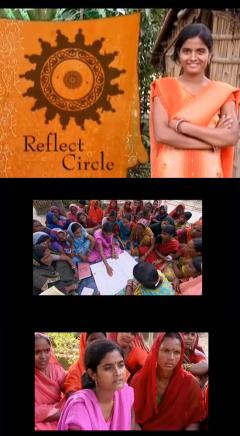by Ishita Kapoor
(from actionaid india)
“The most powerful weapon on earth is the human soul on fire”
-Ferdinand Foch, (also seen on the One Billion Rising Facebook Page)
**********************************************************************
We are witnessing a time in history that’s probably most crucial for women and girls in India. The unfortunate incident in Delhi has triggered a series of reactions across the country, where (though largely led by the urban middle class), women and some men too are beginning to question all the age-old customs and mindsets that have actively discriminated against women. It is heartening to see that discussions about violence faced by women and the need for gender justice is back into the mainstream media and popular discussions, in ways never seen before.
 Through a simple, yet scientific technique called REFLECT (developed on the basis of theories by a Brazilian educator named Paulo Freire), these women in Samastipur village came together, held meetings and took decisions that changed the power structure in that community.
Through a simple, yet scientific technique called REFLECT (developed on the basis of theories by a Brazilian educator named Paulo Freire), these women in Samastipur village came together, held meetings and took decisions that changed the power structure in that community.
The frustration of being treated as the weaker sex has struck every woman sometime or other and the Delhi events have brought to the fore women’s resolve to come out of that victim mode. The power of women’s resistance is so evident that a large section of the men have stood shoulder-to-shoulder with women in this demand for equality and social justice.
To quote one of our colleagues’ reactions during the days of the protests,
It is heartening to see that women are taking charge. It is important that this energy is kept alive. Dalit and tribal women who face violence of a similar kind are also supportive of this movement. Let's remember to stand by them as well, when they are in distress. That is when this 'movement' will become more representative and powerful.
In this context, let me bring your attention to one of ActionAid India’s community efforts in rural Bihar. This story is about a group of women in the district of Samastipur, in the second most populated state of India where their lives and identity, till a few years ago were tied to their husbands, are now changing for good. They have started challenging a life dominated by men and caste discriminations, where they were deprived of even the basic facilities required for survival. These women and girls are usually the last to eat and get much less than their daily requirement of nourishment. The boys in the family get preference to go to school while their sisters are kept back at home to do the housework and refused even elementary education.
 Through a simple, yet scientific technique called REFLECT (developed on the basis of theories by a Brazilian educator named Paulo Freire), these women in Samastipur village came together, held meetings and took decisions that changed the power structure in that community.
Through a simple, yet scientific technique called REFLECT (developed on the basis of theories by a Brazilian educator named Paulo Freire), these women in Samastipur village came together, held meetings and took decisions that changed the power structure in that community.
The essence behind REFLECT circle is to make the women and men who are dis-empowered understand their rights and fight for them, not individually but together.
REFLECT uses unique methods of teaching. The participants gather in groups and are taught by drawing the blueprint of their village. This method makes them understand the distribution of resources and facilities such as the water pumps, wells, schools etc. in their village. This gives them the idea of the power play in their area using which they can demand for better allocation of resources.
REFLECT has given the women in Samastipur a platform to come forward and fight for their rights against many odds like illiteracy, child marriage, domestic violence, gender inequality and unhealthy living conditions. It has taught these women that there is no challenge bigger than their determination to overcome them.
In this short film here, you get to see how these women stood united and have begun protesting against all forms of injustice. It gives you a glimpse into how they take their protests to courts and other government institutions and how they have started questioning faulty government schemes and sloppy implementations of policies.
Women are indeed taking charge, and to see that the idea of gender equality is taking root in India’s villages and rural landscape is very promising. REFLECT is a small beginning in getting women back on the board. Let’s not forget; when women do well, the society indeed will do well.
(Views expressed in the blog are personal and do not necessarily reflect the views of the Organisation. You can write to the author at ishita.kapoor28@gmail.com)

.jpg)

